LATEST NEWS


On the heels of growing Walmart unrest that began on Thursday, October 4 at the Pico Rivera Walmart in Southern Los Angeles, the first-ever strike in Walmart’s history, activists gathered at Walmart’s headquarters in Bentonville, Arkansas, where Walmart is holding its annual financial analyst meeting. As roughly 200 striking Walmart associates and community supporters rallied in Bentonville in the name of changing Walmart labor practices, an agreement was reached via OUR Walmart for an action aimed at Black Friday, the most anticipated shopping day of the year for consumers and retailers and the kick-off to the holiday shopping season.
On Wednesday morning, a tele-conference with striking Walmart workers and community supporters was staged to announce new calls for change at Walmart. At the helm was Daniel Schlademan, Director at Making Change at Walmart, who emphasized the push towards Black Friday. He was echoed on the call by Evelyn Cruz (Pico Rivera Walmart employee),
» Read more about: Walmart Workers Threaten Black Friday Action »


Seven million dollars may not sound like a lot to some large corporations, but that amount of money brought into the Long Beach economy each year could mean an economic boost to many people – restaurant owners and car repair shops, landlords and dentists, barbers and beauty salons, shoe stores and bike shops. Seven million dollars is the amount of money that economists at the Economic Roundtable estimate would flow into the Long Beach economy in the first year if Measure N passes and 2,000 hotel workers get a $13/hour minimum wage.
As a result of the wage increase, Measure N will bring in approximately $800,000 per year in increased state and local taxes to help run Long Beach’s schools, pave its streets and help pay for police and firefighters, among other things. And it is estimated that the increased spending power of the affected hotel workers could result in an estimated 85 local jobs created to support their buying power and the economic activity it could generate.
» Read more about: Measure N: Boosting the Long Beach Economy »


The recent summer was a time of troubled reflection for many families confronted by the kind of financial obligations that arise from an increase in energy use. They spent warm, restless nights worrying about the difficult decisions they’d have to make about how to spend their limited resources. As a canvasser for RePower LA, I was a first-hand witness to the struggles that Los Angeles residents are facing in their attempts to provide a decent-quality life for their families.
RePower LA is a coalition of community organizations, environmentalists, small businesses and the International Brotherhood of Electrical Workers Local 18 that has been advocating for energy efficiency programs that create good jobs and provide services to struggling communities. During the long heat wave my fellow canvassers and I walked neighborhoods in Northeast Los Angeles to raise awareness about three existing and soon-to-be created energy efficiency programs, and to find people who could benefit from them.
» Read more about: RePower LA: Taking a Community's Temperature »


Newspapers across California are calling out Proposition 32—a ballot measure that would outlaw using automatic payroll deductions from union members and corporations for political purposes. Editorial writers and columnists charge the initiative is dishonest for positioning itself as an anti-corporate campaign finance effort — even as supporters of the initiative have recently taken to union-bashing to frame their arguments. However, for a period of several months over the summer, Prop. 32 backers did their best to fool Californians with a disingenuous Occupy Wall Street-inspired “fight the power” advertising campaign. Let’s take a look at some vintage Trojan Horse political advertising.
0 minutes 05 seconds – Nice special effects. Michael Bay is impressed.
0:16 – Does that briefcase combination read “666”? Perhaps the flow of “special interest” money into politics is a deal with the devil. Only problem: The devil is wearing a wedding band. Given that such Christian conservative Proposition 8 backers as Howard Ahmanson and Larry T.
» Read more about: Disconnected From Reality: Prop. 32's AT&T Ad »


On September 30, Governor Jerry Brown vetoed six different economic development bills designed to get California’s economy going again, including the groundbreaking Senate Bill 1156, known as the Sustainable Communities Bill, which has been written about before in Frying Pan News. Despite the fact that the sustainable communities program would have reinvented the old redevelopment in a completely new image and restarted sustainable community project areas from scratch, the governor argued that he wanted to see the old redevelopment completely dissolved before starting anything new.
Undaunted, state Senator Darrell Steinberg – the author of SB 1156 – has vowed to reintroduce the bill at the very beginning of the next session (January, 2013) and get it passed through the legislature and signed by the governor early in the year. In fact, according to a letter sent to coalition activists, Sen. Steinberg has already reserved the first bill number available to members of the state Senate,
» Read more about: Development Coalition Vows Fight for New Bill's Passage »


President Obama this week designated the home and burial site of the legendary United Farm Workers (UFW) leader, César Chávez, a national monument. Known as La Paz, short for Nuestra Señora Reina de la Paz, or Our Lady Queen of Peace, the site is in Keene, California
AFL-CIO President Richard Trumka says the designation is a
fitting tribute for a man whose campaign for civil rights and respect for workers struggling in the shadows broke new ground and left an indelible mark on the pages of American history. The farm worker movement that Chávez is most often associated with was never deterred by their lack of money or clout. These workers knew that together they could form a mighty force for justice. Their collective action through the United Farm Workers brought national support to the moral cause and won historic victories and protections for agricultural workers.
» Read more about: César Chávez Home Becomes a National Monument »


Workers at hotels near LAX on Century Boulevard are supposed to be covered under a 2008 Living Wage Ordinance providing wages of at least $11.97 an hour. A new class action lawsuit alleges that the Holiday Inn LAX willfully violated a host of wage and hour laws — and workers have revealed that conditions at the hotel are unsafe for guests.
UNITE HERE Local 11, who are supporting bartenders, housekeepers, cooks and other Holiday Inn LAX employees, issued a press release on the new class-action lawsuit, that seeks damages for, “back wages, not respecting [employees’] right to take meal breaks, not reimbursing them for expenses incurred while performing their work, and failure to pay them the mandatory ‘Living Wage’ required for all LAX-area hotels.”
Workers allege that they worked over eight hours a day without being paid overtime, their time sheets were tampered with,
» Read more about: LAX Holiday Inn Workers Allege Living Wage Violations »


“Money is the mother’s milk of politics,” Gloria Romero tells me on the phone. “It’s flowing to both sides. Government isn’t about drawing lines. It’s not about saying you’re on that side and you can’t come over.”
Her voice is friendly, somewhat placid, but it’s clear Romero is not thrilled with having to answer questions about her political alliance with the Koch brothers and other wealthy supporters of Proposition 32, and she conspicuously avoids bringing up their names. When pressed about the Kochs and the money behind behind Prop. 32, she falls back upon her experience in Sacramento.
“I have sat in the belly of the beast,” she says. “I have seen the realities of money and its influence.”
With Election Day still one month away, the battle to pass Prop. 32 has seen its share of political shockers, including the sudden injection of $4 million of Koch brother money to the Yes on 32 campaign,
» Read more about: How Gloria Romero Became the Face of Proposition 32 »


The Pasadena/Foothills Chapter of American Civil Liberties Union of Southern California ACLU-SC honored longtime Los Angeles Times journalist, editor and commentator Tim Rutten at its 12th Annual Garden Party on October 2 at the Western Justice Center in Pasadena. Rutten, who had been let go this past summer after nearly 40 years at the Times, spoke to the more than 100 attendees of the threat to civil liberties by the demise of the press in the country and concentration into fewer and fewer corporate hands. He talked about a wide range of topics concerning knowledge, ignorance, and the consequences of media conglomeration.
“The coming concentration of the media is probably a bigger threat to your civil liberties than anything the government’s doing right now,” he said.
“Knowledge isn’t just power, it’s self-protection. Most of the newspapers in this country today are hollow shells of what they were 10 years ago and sadly diminished from what they were five years ago,” Rutten continued.
» Read more about: Tim Rutten: Corporate Media Concentration a Big Threat »
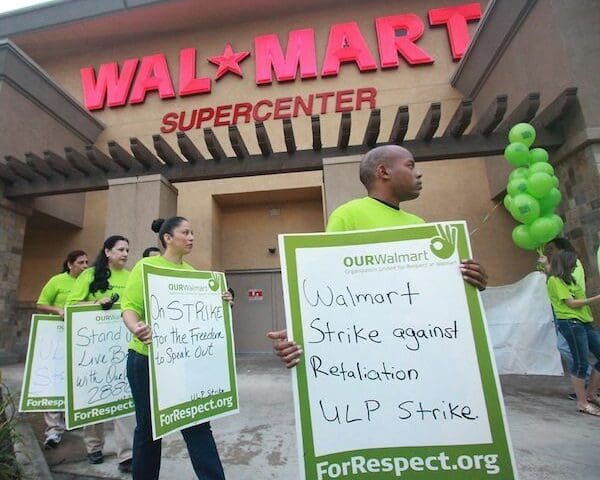

“Good morning, everyone. My name is Venanzi Luna and I’m on strike.” With those words, today’s rally at the Pico Rivera Walmart made history as the first ever strike of Walmart workers in the United States.
More than 300 people descended on the store to support the nearly 75 workers who walked off the job today to protest retaliation by the corporate giant. Associates from other stores across Los Angeles, including Duarte, Panorama City and Orange County also joined in the walkout and attended the landmark event. Associates who are members of the group Our Walmart were recently fired for speaking about the cutting of hours, reductions in health benefits and poverty jobs that force many to seek out public assistance programs to stay afloat.
Workers, joined by their spouses and children, cheered and nodded in agreement as fellow store associates talked about what they hoped to achieve by standing up.
» Read more about: Pico Rivera Rally Supports Walmart Strikers »


We survived Carmageddon II last weekend, so pat yourself on the back now for having made it! Or as I’ve heard others call Carmageddon, the “Rampture.” The I-405 Freeway, from the I-10 to Highway 101, was closed for the second time in 14 months for the Sepulveda Pass Improvements Project, which will add desperately needed carpool lanes to the 405 Freeway. (Though what we really need is better public transit, but I digress)
Metro and elected officials warned us for months—“It’s coming!”
They pleaded with the public—leave your cars at home, stay away from the area, shop, play, and dine locally. As an L.A. native, I’ve had my fair share of moments of being stuck in dreadful traffic, so when they asked that I leave my car at home, I sure did—both last year and this past weekend. And almost every day of the year—for my own sanity and because our city can use one less car on the road.
» Read more about: Carmageddon II : Did You Breathe Better Last Weekend? »
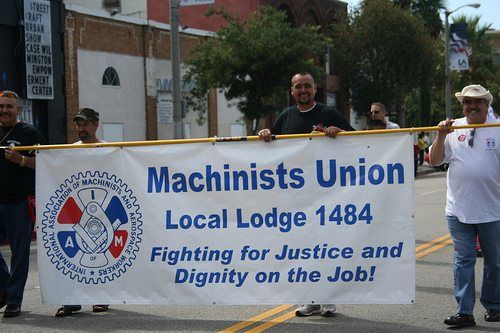

This legislative session brought some exciting victories as well as some deep disappointments. Labor accomplished big things this year that benefit all Californians but when it came to advancing worker protections, many of those bills were vetoed.
Successes:
» Read more about: State Labor Legislation, 2012: Wins and Losses »


In Los Angeles, the reins of power lie in the hands of a very few. By “power” I mean “electricity,” and there are only a few men and women whose job it is to procure and dispense it. Last week I wrote about the “Magic City,” and all the unseen infrastructure and work that goes into delivering the power and water that we city dwellers usually take for granted. There may be no better example of this unseen work than a certain unremarkable-looking Los Angeles Department of Water and Power building. Inside is a two-story main control room lined with a schematic map of the power system, a 180-degree wrap-around diagram that lights up where there are trouble spots and gives workers a robotic bird’s-eye view of L.A.
It is from this nondescript building that the LADWP brings in electricity from all over the American West, no easy task considering that our usage varies dramatically depending on the season and time of day.
» Read more about: The High Cost of Hot Days: LADWP and Peak Demand »
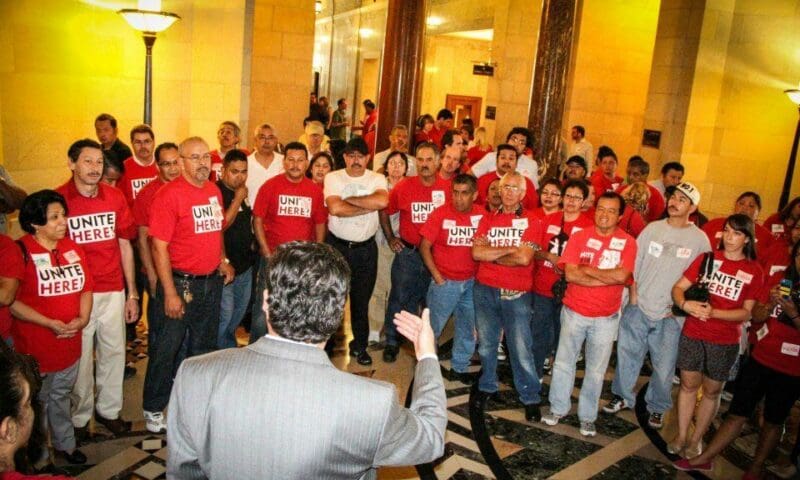
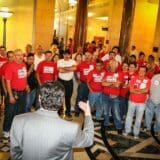
A couple of weeks ago I sat in on a meeting of the leadership of some local hotels. These were not the hotel managers, but the leaders among the workers who clean the rooms, clear the tables, chop the vegetables in the kitchen, vacuum the rugs in the lobby and perform all the other back-breaking tasks that make a hotel comfortable for guests.These people – all from hotels with union contracts – face tough negotiations going into the fall and their workplaces could face serious competition from several proposed downtown hotel projects.
Nearly all these men and women, many of whom arrived wearing the uniforms of their hotels, spoke Spanish. This put me at a serious disadvantage because despite my efforts to learn this beautiful language, I can’t seem to speak it and I can hardly understand the rapid sentences thrown back and forth between people who all know one another and have worked together for years.
» Read more about: Found in Translation: A Union Contract's Strengths »


Two legendary figures — environmental scientist and activist Barry Commoner and historian Eric Hobsbawm — died on Sunday, both at the age of 95. Both changed the way we view the world. Both influenced scholars and activists alike.
Barry Commoner: I posted a tribute to Commoner on the Huffington Post and The Nation. He followed Rachel Carson as America’s most prominent modern environmentalist. He viewed the environmental crisis as a symptom of a fundamentally flawed economic and social system. A biologist and research scientist, he argued in his best-selling books and many articles that corporate greed, misguided government priorities, and the misuse of technology undermined “the finely sculptured fit between life and its surroundings.” He insisted that scientists had an obligation to make scientific information accessible to the general public, so that citizens could participate in public debates that involved scientific questions.
» Read more about: Remembering Barry Commoner and Eric Hobsbawm »


(The following message from Edward James Olmos is republished from the L.A. County Federation of Labor, AFL-CIO, with permission. The concert mentioned took place Oct. 3.)
Forgive me, but I’m going to be blunt. Proposition 32, the so called “Stop Special Interest Money Now Act” is a misleading, cynical and unfair attack on working families and labor unions.
That’s why I’m standing with Working Californians and their No on Prop 32 campaign. And that’s why Crosby, Stills & Nash and Tom Morello: The Nightwatchman are joining Working Californians to play a special benefit concert in support of the No on Prop 32 campaign this October 3rd at Nokia Theatre L.A. LIVE. Want to come and join me?
Get your free ticket for the No on Prop 32 concert with Crosby, Stills & Nash and Tom Morello: The Nightwatchman, at the link below:
https://action.truthonprop32.org/concert
The people behind Prop 32 wrote in giant loopholes and created special exemptions to give billionaire CEOs,
» Read more about: Edward James Olmos: Come to the Stop Prop. 32 Concert »
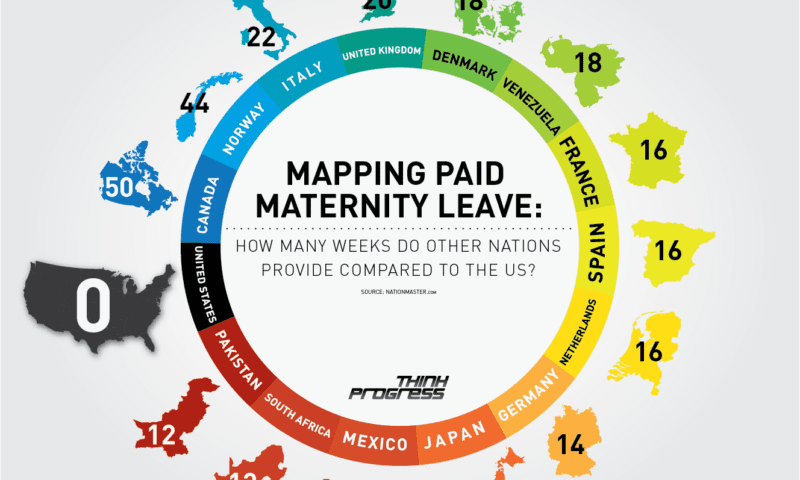
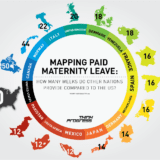
When we found out we were expecting twins in 2005, my husband was a teacher and I worked for a small non-profit. We were overjoyed but anticipated a tight squeeze in our small, two-bedroom apartment, where we lived with our 9-year-old son. We were lucky to live in California, where we could worry more about where to put twin cribs than how we would financially survive my maternity leave. That’s because, in 2002, California became the first state in the country to pass Paid Family Leave (PFL). This benefit has made a huge difference for thousands of families like mine who could not otherwise afford to take time off to bond with a new baby or care for a seriously ill family member.
Cassandra Engeman, author of a new policy brief, “Ten Years of the California Paid Family Leave Program: Strengthening Commitment to Work, Affirming Commitment to Family,” lauds the passage of Paid Family Leave as the first step toward filling a huge gap in public policy.
» Read more about: The Right to Care: State's Paid Family Leave Turns 10 »
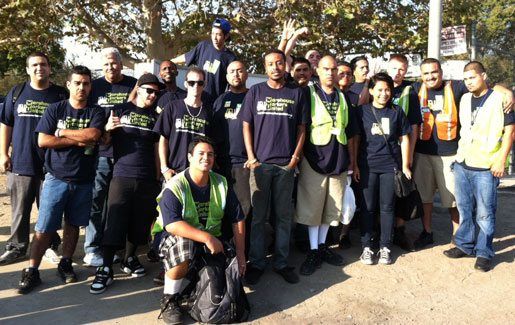

Workers at a Southern California warehouse that moves Walmart merchandise returned to work after a 15-day strike that included a six-day, 50-mile pilgrimage for safe jobs.
By midnight Friday morning, workers from all three shifts at the 24-hour facility returned to work after winning safety improvements on the job and drawing a response from Walmart about poor working conditions in its contracted warehouses.
“We no longer feel like we are working in the shadows,” said Carlos Martinez, a warehouse worker who went on strike and participated in the 50-mile WalMarch from the warehouses in the Inland Empire to Downtown Los Angeles. “We’ve never had this much attention on our working conditions and I have never felt this much support. I feel ecstatic going back to work and proud that we have all stood together as a team.”
Though Walmart initially dismissed workers concerns about conditions on the job as “unfounded,” by the end of the six-day march,
» Read more about: Inland Empire Warehouse Strikers Return to Work »